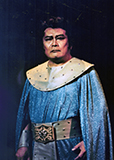
吳文修(1935-2009),聲樂家。出生於彰化。就讀臺灣省立彰化工業職業學校期間,與廖朝墩習唱。1963年前往日本,1967年畢業於桐朋大學音樂部門。同年8月,前往西德柏林德意志歌劇院附屬歌劇研究所研習。1970年,以優異成績畢業,成為該院的簽約歌手,開始他職業的演唱生涯。1973年以《丑角》中的卡尼歐大放異采,為當時登上歐洲歌劇院的唯一亞洲男高音,足跡遍及西德、英國、義大利、比利時及美國等地。1976年名列紐約《時代》雜誌所出版的《世界歌劇名人錄》。1977年應教育部之邀,回臺舉行獨唱會,1982年組首都歌劇團,培植聲樂新秀,亦與臺北市立交響樂團合作演出,積極推展歌劇藝術,代表演唱曲目為《丑角》、《奧泰羅》、《阿伊達》等。吳文修所達到的演唱成就,臺灣至今無男高音能出其右。
Wu, William (1935-2009), professionally known as William Wu, was an opera singer and was born in Changhua. During his studies at Taiwan Provincial Changhua Industrial Vocational School, he began taking vocal lessons with Liao Chao-tun. In 1963, Wu moved to Japan, and he graduated from the Toho Gakuen School of Music in 1967. In August of the same year, Wu would continue his studies at the Deutsche Oper Berlin’s Affiliated Opera Research Institute in West Germany. After graduating with honors in 1970, Wu became a signed singer of the Deutsche Oper Berlin, marking the beginning his professional singing career. In 1973, Wu made a huge breakthrough with his performance of Canio from Pagliacci, becoming the only Asian tenor in the European opera scene at the time. Wu traveled and performed in West Germany, Britain, Italy, Belgium and the United States among other places. In 1976, he was listed in the “Who's Who Opera” published by New York Times magazine, and in the following year, at the invitation of the Ministry of Education, he returned to Taiwan to hold a solo recital. In 1982, he founded the Capital Opera Troupe with the intent of training Taiwanese opera talent. Wu would also collaborate with the Taipei Symphony to actively promote the art of opera. Wu was best known for his performances in the operas, Pagliacci, Otello, and Aida among many others. The achievements Wu made over his career has not yet to be matched by another tenor from Taiwan.
